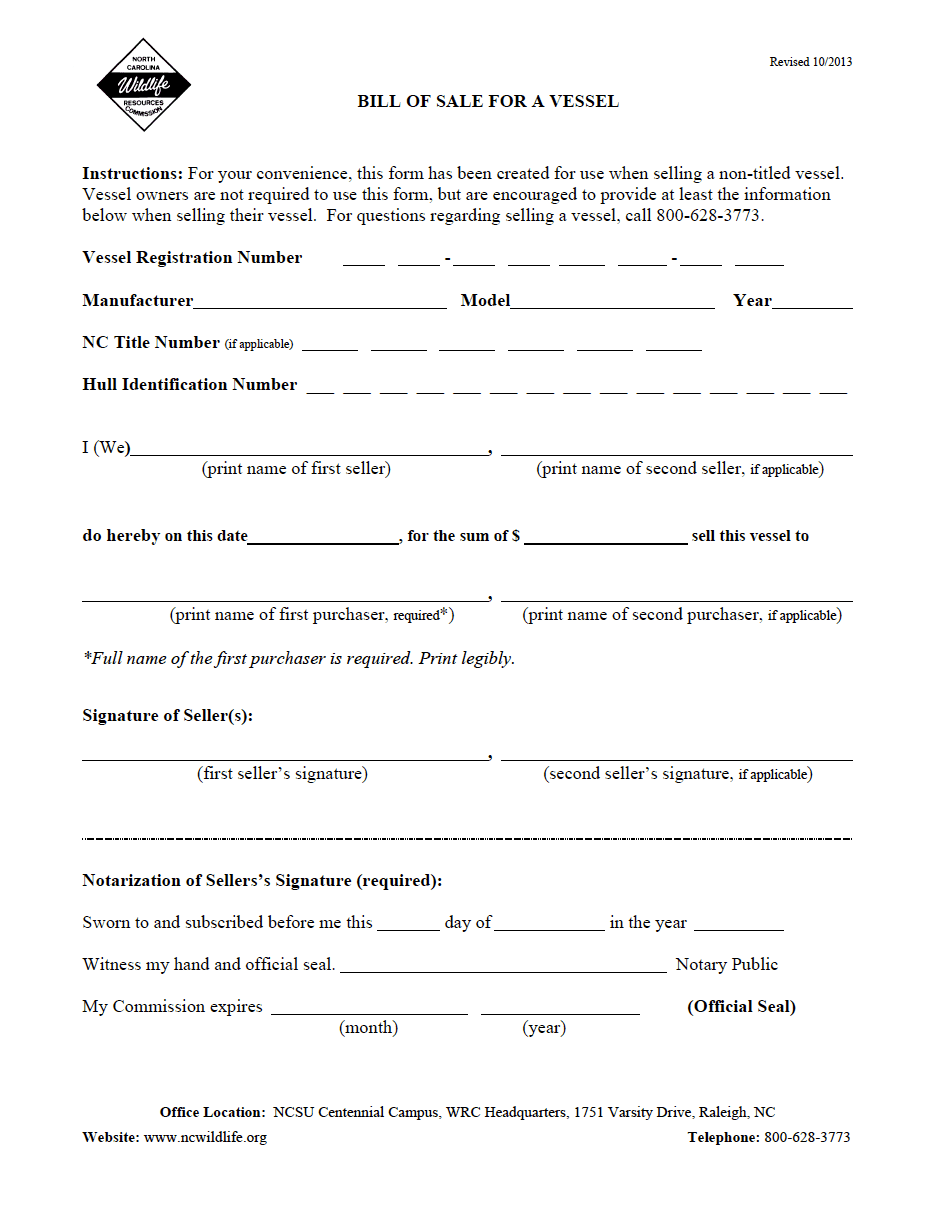North Carolina Boat Bill of Sale Form
A North Carolina boat bill of sale form is a binding agreement between a seller and buyer for a vessel transfer and its ownership reassignment. It summarizes the watercraft’s details by including its vessel registration number, manufacturer, model, year, title number, hull identification number (HIN), and price. In most private sales, warranties and liabilities do not exist. However, the buyer and seller must provide this information if it does. The boat bill of sale also legally protects both parties and officially records the transaction.
|
What is a North Carolina Vessel Bill of Sale?
A North Carolina vessel bill of sale is a legal document showing a boat sold from one person to another. Buyers and sellers must have this form when purchasing or trading a vessel, as it proves that they legally transferred the property among one another. If two (2) purchasers or sellers exist, both individuals must print or sign their names. A Notary Public must also acknowledge the document by dating it and providing their Commission details and signature. The state only recognizes notarized bill of sale forms.
Did You Know?To legally operate a vessel, anyone fourteen (14) years or older must have a boater education certificate. However, the individual only needs a certificate to drive the boat if an adult over eighteen (18) years old is present and compliant with G.S. 16.2. Furthermore, anyone born on or after January 1, 1988, must pass a NASBLA-approved boating education course before publicly driving a motorized vessel over ten (10) horsepower. No one under fourteen (14) can legally operate a vessel. |
How to Register a Boat in North Carolina (5 Steps)
Boats with motor capabilities and sailboats measuring fourteen (14) feet or longer must have a title and registration for public waterway use. Out-of-state residents must obtain a North Carolina registration if they use it for more than ninety (90) consecutive days within borders. Any boat that has a title must also have tags.
Step 1 – Exemptions
Boats that do not require registration include vessels that are unused, kept on dry land, non-motorized (e.g., kayaks, rowboats, canoes, and rafts propelled by oars, paddles, or the current), or used solely as lifeboats.
Step 2 – Title
All motorized vessels and sailboats fourteen (14) feet or longer must have a title. Ships with active liens must have documentation, with the paperwork held by the lienholder until the loan is satisfied. The cost of titling depends on the vessel size and services. Residents of North Carolina can title their vessels at a Wildlife Service Agent, by mail using Form VL-1, or at the North Carolina Wildlife Resources Commission (NCWRC) headquarters in Raleigh.
Step 3 – Registration
All first-time vessel registrations must occur with a Wildlife Service Agent using Form VL-1. The registration cost depends upon the size of the boat and the services ordered. The seller must hand over a signed and notarized Certificate of Title to the buyer if documentation exists. If the previous owner did not title it, they must give the purchaser a signed and notarized Bill of Sale instead. Registering a vessel without one of the notarized documents is impossible. Wildlife Service Agents are not responsible for homemade vessel registration; registration must be done either by mail or at the NCWRC headquarters.
Step 4 – Numbers + Decal
Owners must permanently put the vessel registration number on the front of each side of the vessel where others can see it clearly. It must be in block letters at least three (3) inches tall and in a solid color that contrasts with the background. The numbers and letters must be in the same order as it appears on the certificate of number, with the groups separated by hyphens or spaces.
The validation decal belongs on the right-hand side of the boat’s front. Owners must remove the old validation decal before applying the new one. They should also ensure that the temperature is above 40 degrees Fahrenheit and that the boat’s surface is clean and dry before attaching the sticker. The decal must appear within six (6) inches of the boat’s registration number.
Step 5 – Renew
Vessel tags issued by the North Carolina Wildlife Resources Commission require a renewal every one to three years. The length chosen during the previous registration determines the expiration date. Owners can conveniently renew their tags online, by phone (800-628-3773), email (vessels@ncwildlife.org), or by visiting an in-person agent. Renewal can take place up to sixty (60) days before the expiration date.
| Mailing Address: |
| North Carolina Wildlife Resources Commission Transaction Management 1709 Mail Service Center Raleigh, NC 27699 |
